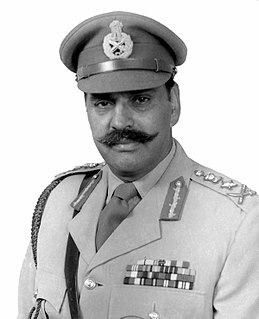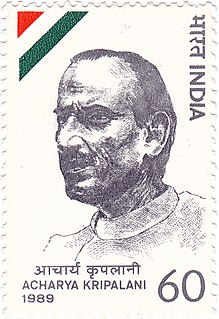
Jawaharlal Nehru was an Indian anti-colonial nationalist, secular humanist, social democrat and author who was a central figure in India during the middle of the 20th century. Nehru was a principal leader of the Indian nationalist movement in the 1930s and 1940s. Upon India's independence in 1947, he served as the country's prime minister for 17 years. Nehru promoted parliamentary democracy, secularism, and science and technology during the 1950s, powerfully influencing India's arc as a modern nation. In international affairs, he steered India clear of the two blocs of the Cold War. A well-regarded author, his books written in prison, such as Letters from a Father to His Daughter (1929), An Autobiography (1936) and The Discovery of India (1946), have been read around the world.

The prime minister of India is the head of government of the Republic of India. In practice, ordinarily, and effectively, executive authority is vested in the prime minister and their chosen Council of Ministers, though the president of India is the constitutional, nominal, and ceremonial head of state. The prime minister is often the leader of the party or the coalition with a majority in the lower house of the Parliament of India, the Lok Sabha, which is the main legislative body in the Republic of India. The prime minister and their cabinet are at all times responsible to the Lok Sabha.

The Indian National Congress (INC), colloquially the Congress Party but often simply Congress, is a political party in India with widespread roots. Founded in 1885, it was the first modern nationalist movement to emerge in the British Empire in Asia and Africa. From the late 19th century, and especially after 1920, under the leadership of Mahatma Gandhi, Congress became the principal leader of the Indian independence movement. Congress-led India to independence from the United Kingdom, and powerfully influenced other anti-colonial nationalist movements in the British Empire. Due to its enduring history, the Congress is often called the "grand old party".

General Om Prakash Malhotra, PVSM, best known as OP Malhotra, was a senior army officer in the Indian Army who served as the 10th Chief of Army Staff of the Indian Army from 1978 – 1981. Upon retiring from his military service in India, he served in the Indian Foreign Service when he tenured as the Indian Ambassador to Indonesia 1981-1984, and later served as a political administrator in India as the Governor of Punjab and Administrator of Chandigarh 1990-1991.

Jivatram Bhagwandas Kripalani, popularly known as Acharya Kripalani, was an Indian politician, noted particularly for holding the presidency of the Indian National Congress during the transfer of power in 1947 and the husband of Sucheta Kripalani. Kripalani was an environmentalist, mystic and independence activist who was long a Gandhian socialist, before joining the economically right wing Swatantra Party later in life
Malhotra is an Indian surname of the Dhai Ghar sub-group of Khatris from Punjab. It is modified usage of Mehrotra which in turn is a modified form of Mehra
Manikonda Chalapathi Rau was an Indian journalist and an authority on the Nehruvian thought. Rau was editor of the English-language daily National Herald of Lucknow for over thirty years from 1946. The National Herald was founded by Jawaharlal Nehru in 1938. He wrote several books on Indian journalism, politics and personalities. During the independence struggle he was part of the underground press movement.

Vidya Bharati is the educational wing of Rashtriya Swayamsevak Sangh (RSS). It runs one of the largest private network of schools in India, operating 12,000 schools with over 3.2 Million students, as of 2016 and has its registered headquarters in Lucknow with a functional headquarters in Delhi and a sub-office in Kurukshetra. In the year 2020, the million lives club selected Vidya Bharati as an official member of Vanguard cohort for its contribution to school education.

The Nehru–Gandhi Family is an Indian political family that has occupied a prominent place in the politics of India. The involvement of the family has traditionally revolved around the Indian National Congress, as various members have traditionally led the party. Three members of the family – Jawaharlal Nehru, Indira Gandhi, and Rajiv Gandhi – have served as the prime minister of India, while several others have been members of the parliament.
The National Policy on Education (NPE) is a policy formulated by the Government of India to promote and regulate education in India. The policy covers elementary education to higher education in both rural and urban India. The first NPE was promulgated by the Government of India by Prime Minister Indira Gandhi in 1968, the second by Prime Minister Rajiv Gandhi in 1986, and the third by Prime Minister Narendra Modi in 2020.
Krishna Kumar is an Indian intellectual and academician, noted for his writings in the sociology and history of education. His academic oeuvre has drawn on multiple sources, including the school curriculum as a means of social inquiry. His work is also notable for its critical engagement with modernity in a colonized society. His writings explore the patterns of conflict and interaction between forces of the vernacular and the state. As a teacher and bilingual writer, he has developed an aesthetic of pedagogy and knowledge that aspires to mitigate aggression and violence. In addition to his academic work, he writes essays and short stories in Hindi, and has also written for children. He has taught at the Central Institute of Education, University of Delhi, from 1981 to 2016. He was also the Dean and Head of the institution. From 2004 to 2010, he was Director of the National Council of Educational Research and Training (NCERT), an apex organization for curricular reforms in India. He was awarded the Padma Shri by the President of India in 2011.

Agneepath is a 2012 Indian Hindi-language action drama film produced by Hiroo Yash Johar and Karan Johar under Dharma Productions and directed by Karan Malhotra in his directorial debut. A remake of the eponymous 1990 film directed by Mukul S. Anand and starring Amitabh Bachchan, it centers on a screenplay written by Malhotra and Ila Dutta Bedi, with dialogues written by Piyush Mishra. The film stars Hrithik Roshan, Sanjay Dutt, Rishi Kapoor, Priyanka Chopra, Kanika Tiwari, Om Puri and Zarina Wahab. It follows Vijay Deenanath Chauhan (Roshan), a common man from the island village of Mandwa who seeks revenge for his father's humiliation and murder at the hands of Kancha Cheena (Dutt); in the process, he befriends Rauf Lala (Kapoor), an underworld gangster, and falls in love with a loquacious girl, Kaali Gawde (Chopra).
Vivekananda Kendra Vidyalaya or VKV is the academic wing of Vivekananda Kendra, operating a chain of schools under the project Vivekananda Kendra Siksha Prasar Vibhag (VKSPV). Vidyalaya is a sanskrit word meaning school. The corporate headquarters of the organization is at Kanyakumari, Tamil Nadu in southern India. The ideology of Gyan – Yagna, meaning Knowledge Worship, started by Ekanathji Ranade led to the inception of VKV. The school teachings are inspired by the Vivekananda's philosophy of Man – Making & Nation Building.
Sarva Shiksha Abhiyan, or SSA, is an Indian Government programme aimed at the universalisation of Elementary education "in a time bound manner", the 86th Amendment to the Constitution of India making free and compulsory education to children between the ages of 6 to 14 a fundamental right. The programme was pioneered by former Indian Prime Minister Atal Bihari Vajpayee. It aims to educate all children between the ages 6 to 14 by 2010. However, the time limit has been pushed forward indefinitely.
BHEL TOWN, Bhopal is a suburb of Bhopal, Madhya Pradesh. This has developed like other BHEL townships after Indian public sector engineering company BHEL started its operations here. It is spread over an area of around 20 km2 and provides facilities like, parks, community halls, library, shopping centers, banks, post offices etc. Besides, free health services is extended to all the employees through 350 bedded Kasturba Hospital and chain of dispensaries.

Ajai Malhotra is a former Indian career diplomat who served as Ambassador of India to the Russian Federation. He is the Chairperson of the Advisory Committee to the United Nations Human Rights Council, Geneva.
S. K. Misra is a retired Indian civil servant, social worker, writer and a former Principal Secretary to Chandra Sekhar, the 8th Prime Minister of India. He served as the principal secretary to three chief ministers of Haryana and is a former secretary at the ministries of Tourism, Civil Aviation and Agriculture. He is one of the founders of Motilal Nehru School of Sports, Rai and the founder chairman of Indian Trust for Rural Heritage and Development. The Government of India awarded him the third highest civilian honour of the Padma Bhushan, in 2009, for his contributions to Indian civil service.
Anil Kumari Malhotra is an Indian homoeopathic physician and the principal of Nehru Homoeopathic Medical College and Hospital of Delhi University. She is an alumnus of the Shri Sai Nath Post Graduate Institute of Homeopathy from where secured MD in homoeopathy in 2006 and has been holding the position of the principal of Nehru Medical College since 1 August 2007. She is known to have published several medical papers, has conducted medical workshops, featuring her presentations and participated in many continuing medical education programs. The Government of India awarded her the fourth highest civilian honour of the Padma Shri, in 2016, for her contributions to medicine.

After the de facto merger on 1 November 1954 and before the legal integration with the Indian Union on 16 August 1962, general elections were held in 1955 and 1959. So. the first general elections to the Pondicherry Representative Assembly were held in 1955 from July 18 to 23 for 39 constituencies to constitute First Pondicherry Representative Assembly. The election were held on the basis of adult franchise under the State of Pondicherry Order, 1955 which prescribed the rules and regulations for the conduct of elections, more or less on the pattern adopted in the Indian Union.









